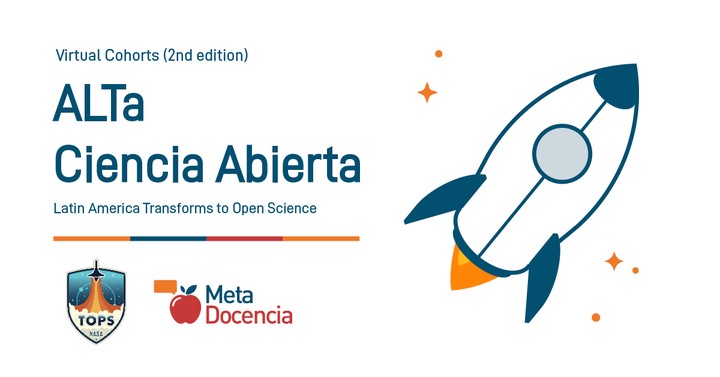ALTa Ciencia Abierta 2 2024

Table of Contents
ALTa Ciencia Abierta 2 2024
Together with NASA, MetaDocencia invites people from Spanish-speaking communities to join 6-week online training cohorts to extend the principles of Open Science in Latin America and beyond.
In addition to teaching NASA TOPS Open Science 101, the ALTa Ciencia Abierta mission will contextualize this knowledge to identify and learn about innovative experiences and practices of Open Science specific to the spaces and regions of the people participating in the cohorts.
Registration is free and open, and the cohorts will have a certificate of attendance issued by MetaDocencia, with the option of certifying the Open Science knowledge acquired through NASA. Both cohorts and certifications will be online and 100% in Spanish.
Why participate?
The objective of this training will be to make the NASA Open Science contents dialogue with cases, experiences, and initiatives in Latin America that reify the practice of Open Science.
Participants completing this training will be able to:
- Have a first approach to the Open Science principles, techniques, and tools.
- Participate in a Spanish-speaking exchange space about Open Science.
- Connect with other Spanish-speaking people interested in Open Science.
- Integrate a friendly and safe space for sharing their Open Science initiatives and projects.
- Update their Open Science knowledge to strengthen their projects and practices.
- Access a certification endorsed by NASA.
For whom?
MetaDocencia believes in gathering researchers and technicians of all levels and from diverse disciplines. Diversity enriches the conversations and generates exchange spaces that are transversal and open. That contributes to increasing epistemic justice and fostering collaborations between diverse knowledge areas.
We hope that Spanish-speaking researchers and technicians can join us if they:
- Are interested in approaching, curious to debate, or to build knowledge about Open Science in Spanish-speaking contexts. If this is your first approach to Open Science, it will be an honor to count you among the participants in the course!
- Have participated in Citizen Science, networks, events, or communities associated with these topics;
- Have some (considering a wide range between a little and a lot) experience working in open initiatives such as publications, data, research, archives, or repositories, among others;
- Teach or disseminate science and technology in a teaching or communications role.
What does this training not include?
- In-depth development and extensive practice of Open Science principles.
- Theory of science or epistemology.
- Use of Open Science focused on specific disciplines.
Duration
Each cohort will have one 3-hour-long synchronous online meeting per week during 6 weeks, with breaks away from the screen every approximately 50 minutes.
During the meetings, we will reflect on the five NASA TOPS Open Science 101 course modules. They will include activities to promote exchange, discussion among peers in breakout rooms, and presentation of initiatives or projects of those who attend.
Schedule
The first meeting will introduce the key concepts of the module, term definitions, and the importance of contextualization. We will also explain the modality of the meetings and the communication channels. In modules 2 to 5, we will present a case or project with a Latin American perspective to illustrate the recommendations on the subject with contextualized good practices. The sixth meeting is a Plenary of Open Science Initiatives in which the participants of the cohort, as leaders of regional initiatives, will share their experiences and will have the opportunity to exchange ideas and learnings and get in touch with each other to create a community around common interests. In addition, a support space is offered to obtain certification.
| Day/time (UTC-3) | Topic (access the Spanish roadmap of each encounter by clicking) |
|---|---|
| Sat 08-24 - 9 to 12 | The Ethos of Open Science |
| Sat 08-31 - 9 to 12 | Open Tool and Resources |
| Sat 09-07 - 9 to 12 | Open Data |
| Sat 09-14 - 9 to 12 | Open Code |
| Sat 09-21 - 9 to 12 | Open Results |
| Sat 09-28 - 9 to 12 | Plenary of Open Science Initiatives |
To increase the accessibility of this training, we will record each meeting and share the recording the following day.
Certification
Those who participate in the course will have access to a dual certification:
NASA TOPS Certification
For obtaining the certificate of the NASA TOPS Open Science 101, it will be necessary to answer correctly 70% of the questions of each of the 5 questionnaires administered at the end of each meeting. The questionnaires will be available in Spanish, and the last part of the synchronous meetings 1 to 5 will be dedicated to answering them. It will be possible to complete these questionnaires asynchronously (up to 7 days after the last meeting) and redo them during meeting six.
MetaDocencia Certification
MetaDocencia will issue an attendance certificate to those who actively participate, either by attending 4 of the 6 meetings synchronously or by having completed 4 of the 5 questionnaires detailed in the previous paragraph at least 7 calendar days after the date of the last synchronous meeting.
Do you want to reuse any of our content? Please, be our guest!
Our materials are available for free under this CC BY 4.0 license. You can reuse or edit any material that appears here. We only ask that you include a reference to this website or the material citation when available. For further information, please contact us at formacion@metadocencia.org
How to participate
Vacancies are limited for each edition, so we ask you to register only if you will be able to participate. In case the quota is full, we will set up a waiting list so that you can join the next cohort.
This training has been made possible by NASA Grants 80NSSC23K0854 (DOI: 10.5281/zenodo.8430889), and CZI grant DAF2021-239366 and grant DOI https://doi.org/10.37921/522107izqogv from the Chan Zuckerberg Initiative DAF, an advised fund of Silicon Valley Community Foundation (funder DOI 10.13039/100014989).